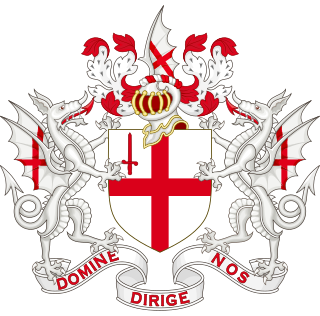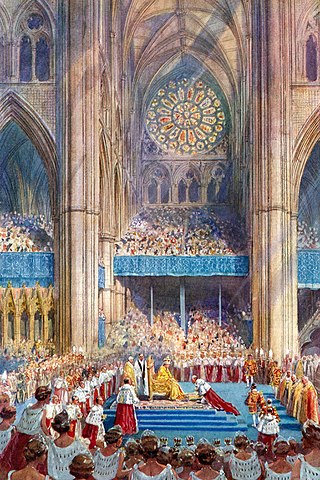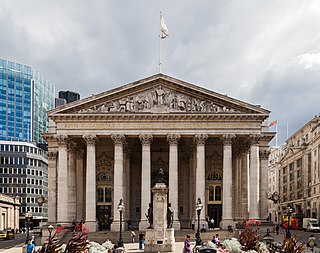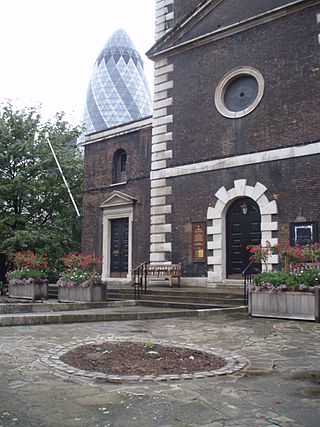Related Research Articles

The City of London, also known as the City, is a city, ceremonial county and local government district that contains the ancient centre, and constitutes, along with Canary Wharf, the primary central business district (CBD) of London and one of the leading financial centres of the world. It constituted most of London from its settlement by the Romans in the 1st century AD to the Middle Ages, but the modern area referred to as London has since grown far beyond the City of London boundary. The City is now only a small part of the metropolis of Greater London, though it remains a notable part of central London. The City of London is not one of the London boroughs, a status reserved for the other 32 districts. It is also a separate ceremonial county, being an enclave surrounded by Greater London, and is the smallest ceremonial county in England.

"God Save the King" is the national anthem of the United Kingdom and the royal anthem of each of the British Crown Dependencies, one of two national anthems of New Zealand, and the royal anthem of most Commonwealth realms. The author of the tune is unknown and it may originate in plainchant, but an attribution to the composer John Bull has sometimes been made.

The Riot Act, sometimes called the Riot Act 1714 or the Riot Act 1715, was an act of the Parliament of Great Britain which authorised local authorities to declare any group of 12 or more people to be unlawfully assembled and order them to disperse or face punitive action. The act's full title was "An Act for preventing tumults and riotous assemblies, and for the more speedy and effectual punishing the rioters", and it came into force on 1 August 1715. It was repealed in England and Wales by section 10(2) and Part III of Schedule 3 of the Criminal Law Act 1967. Acts similar to the Riot Act passed into the laws of British colonies in Australia and North America, some of which remain in force today.

The City of London Corporation, officially and legally the Mayor and Commonalty and Citizens of the City of London, is the local authority of the City of London, the historic centre of London and the location of much of the United Kingdom's financial sector.

In the United Kingdom, the Accession Council is a ceremonial body which assembles in St James's Palace in London upon the death of a monarch to make formal proclamation of the accession of the successor to the throne. Under the terms of the Act of Settlement 1701, a new monarch succeeds automatically. The proclamation confirms by name the identity of the new monarch, expresses loyalty to the "lawful and rightful Liege Lord", and formally announces the new monarch's regnal name, while the monarch and others, in front of the council, sign and seal several documents concerning the accession. An Accession Council has confirmed every English monarch since James I in 1603.

The coronation of the monarch of the United Kingdom is an initiation ceremony in which they are formally invested with regalia and crowned at Westminster Abbey. It corresponds to the coronations that formerly took place in other European monarchies, which have all abandoned coronations in favour of inauguration or enthronement ceremonies. A coronation is a symbolic formality and does not signify the official beginning of the monarch's reign; de jure and de facto his or her reign commences from the moment of the preceding monarch's death or abdication, maintaining legal continuity of the monarchy.

The Royal Exchange in London was founded in the 16th century by the merchant Sir Thomas Gresham on the suggestion of his factor Richard Clough to act as a centre of commerce for the City of London. The site was provided by the City of London Corporation and the Worshipful Company of Mercers, who still jointly own the freehold. The original foundation was ceremonially opened by Queen Elizabeth I who granted it its "royal" title. The current neoclassical building has a trapezoidal floor plan and is flanked by Cornhill and Threadneedle Street, which converge at Bank junction in the heart of the city. It lies in the Ward of Cornhill.

A beadle, sometimes spelled bedel, is an official who may usher, keep order, make reports, and assist in religious functions; or a minor official who carries out various civil, educational or ceremonial duties on the manor.

Queen's Park is an area in North West London and West London, located partly in the City of Westminster and mostly in the London Borough of Brent. Some of the area within Westminster forms a civil parish, the first to be created in London since the right of communities to establish civil parishes was enacted in 2007. The area is located 4 miles (6.4 km) north-west of Charing Cross, and centred around a 30 acres (12 ha) park, which opened in 1887 and was named in honour of Queen Victoria. The area gives its name to Queens Park Rangers football club.
Oyez is a traditional interjection said two or three times in succession to introduce the opening of a court of law. The interjection is also traditionally used by town criers to attract the attention of the public to public proclamations.
A ward is a local authority area, typically used for electoral purposes. In some countries, wards are usually named after neighbourhoods, thoroughfares, parishes, landmarks, geographical features and in some cases historical figures connected to the area. It is common in the United States for wards to simply be numbered.

The monarchy of Antigua and Barbuda is a system of government in which a hereditary monarch is the sovereign and head of state of Antigua and Barbuda. The current Antiguan and Barbudan monarch and head of state, since 8 September 2022, is King Charles III. As sovereign, he is the personal embodiment of the Crown of Antigua and Barbuda. Although the person of the sovereign is equally shared with 14 other independent countries within the Commonwealth of Nations, each country's monarchy is separate and legally distinct. As a result, the current monarch is officially titled King of Antigua and Barbuda and, in this capacity, he and other members of the Royal Family undertake public and private functions domestically and abroad as representatives of Antigua and Barbuda. However, the King is the only member of the Royal Family with any constitutional role.

Elizabeth II was proclaimed queen throughout the Commonwealth after her father, King George VI, died in the early hours of 6 February 1952, while Elizabeth was in Kenya. Proclamations were made in different Commonwealth realms on 6, 7, 8, and 11 February. The line of succession was identical in all the Commonwealth realms, but the royal title as proclaimed was not the same in all of them. Accession was followed sixteen months later by the Coronation of Elizabeth II at Westminster Abbey in London on 2 June 1953.

Portsoken, traditionally referred to with the definite article as the Portsoken, is one of the City of London, England's 25 ancient wards, which are still used for local elections. Historically an extra-mural ward, lying east of the former London Wall, the area is sometimes considered to be part of the East End of London.

The Court of Common Council is the primary decision-making body of the City of London Corporation. It meets nine times per year. Most of its work is carried out by committees. Elections are held at least every four years. It is largely composed of independent members although the number of Labour Party Common Councilmen in 2017 grew to five out of a total of 100. In October 2018, the Labour Party gained its sixth seat on the Common Council with a by-election victory in Castle Baynard ward. The most recent election was in 2022.

Tower is one of the 25 wards of the City of London and takes its name from its proximity to the Tower of London. The ward covers the area of the City that is closest to the Tower.

The monarchy of Belize is a system of government in which a hereditary monarch is the sovereign and head of state of Belize. The current Belizean monarch and head of state since 8 September 2022, is King Charles III. As sovereign, he is the personal embodiment of the Belizean Crown. Although the person of the sovereign is shared with 14 other independent countries within the Commonwealth of Nations, each country's monarchy is separate and legally distinct. As a result, the current monarch is officially titled Kingof Belize and, in this capacity, he and other members of the royal family undertake public and private functions as representatives of the Belizean state. However, the King is the only member of the royal family with any constitutional role.

The City of London is divided into 25 wards. The city is the historic core of the much wider metropolis of Greater London, with an ancient and sui generis form of local government, which avoided the many local government reforms elsewhere in the country in the 19th and 20th centuries. Unlike other modern English local authorities, the City of London Corporation has two council bodies: the now largely ceremonial Court of Aldermen, and the Court of Common Council.
The City of London Corporation elections occur regularly to provide the elected representatives who run the City of London Corporation.
Charles III became King of the United Kingdom and of 14 other Commonwealth realms upon the death of his mother, Elizabeth II, on 8 September 2022. Royal succession in the realms occurs immediately upon the death of the reigning monarch. The formal proclamation in Britain occurred on 10 September 2022, at 10:00 BST, the same day on which the Accession Council gathered at St James's Palace in London. The other realms, including most Canadian provinces and all Australian states, issued their own proclamations at times relative to their time zones, following meetings of the relevant privy or executive councils. While the line of succession is identical in all the Commonwealth realms, the royal title as proclaimed is not the same in all of them.
References
- 1 2 3 Duffield, Chris (May 2011). "Annual Wardmotes March 2011" (PDF). City of London Corporation. Archived from the original (PDF) on 27 September 2011.
- ↑ "Annual Wardmote". City of London Corporation. Archived from the original on 28 April 2012.